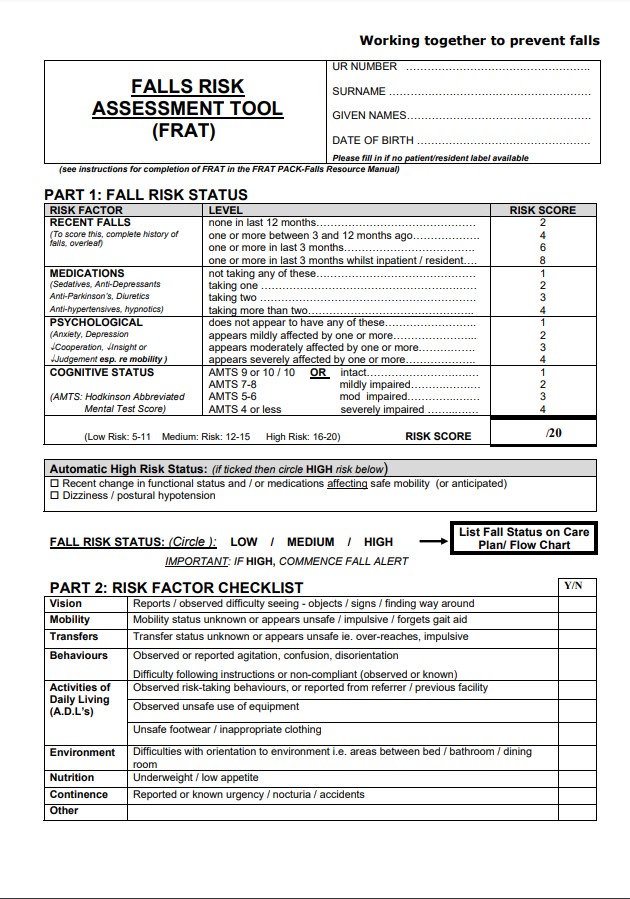Dementia Fall Risk - An Overview
Dementia Fall Risk - An Overview
Blog Article
Everything about Dementia Fall Risk
Table of ContentsDementia Fall Risk Fundamentals ExplainedThings about Dementia Fall RiskUnknown Facts About Dementia Fall Risk9 Simple Techniques For Dementia Fall RiskTop Guidelines Of Dementia Fall Risk
Evaluating fall risk aids the whole health care team develop a safer environment for each patient. Ensure that there is a marked location in your clinical charting system where team can document/reference ratings and document appropriate notes connected to drop avoidance. The Johns Hopkins Loss Threat Analysis Device is one of lots of tools your team can use to assist protect against negative medical occasions.Client drops in health centers are typical and incapacitating adverse occasions that persist regardless of decades of effort to decrease them. Improving interaction throughout the examining nurse, care group, person, and person's most entailed loved ones may strengthen fall avoidance efforts. A group at Brigham and Women's Health center in Boston, Massachusetts, sought to develop a standard autumn prevention program that focused around boosted interaction and individual and household involvement.

The innovation group emphasized that successful execution relies on client and team buy-in, combination of the program right into existing process, and fidelity to program procedures. The team kept in mind that they are grappling with just how to ensure continuity in program execution throughout periods of dilemma. Throughout the COVID-19 pandemic, as an example, an increase in inpatient falls was linked with constraints in client interaction in addition to restrictions on visitation.
Our Dementia Fall Risk Statements
These cases are typically thought about avoidable. To execute the intervention, organizations need the following: Accessibility to Loss pointers sources Autumn ideas training and retraining for nursing and non-nursing staff, including brand-new registered nurses Nursing process that permit for individual and household involvement to conduct the drops assessment, make sure usage of the prevention plan, and perform patient-level audits.
The results can be very detrimental, usually speeding up person decrease and creating longer health center remains. One research study approximated remains enhanced an extra 12 in-patient days after a client autumn. The Fall TIPS Program is based on engaging patients and their family/loved ones throughout 3 major procedures: evaluation, customized preventative interventions, and auditing to make certain that clients are involved in the three-step loss avoidance procedure.
The individual assessment is based on the Morse Autumn Scale, which is a verified fall threat evaluation device for in-patient hospital settings. The range consists of the six most common reasons people in health centers click here for more info fall: the individual loss history, risky conditions (including polypharmacy), use of IVs and various other outside tools, mental standing, stride, and wheelchair.
Each danger factor relate to several actionable evidence-based interventions. The nurse develops a plan that integrates the treatments and shows up to the care team, individual, and family on a laminated poster or published visual aid. Nurses create the plan while meeting the person and the client's family members.
All about Dementia Fall Risk
The poster serves as a communication tool with various other participants of the individual's care team. Dementia Fall Risk. The audit component of the program includes assessing the person's knowledge of their risk variables and prevention strategy at the unit and healthcare facility levels. Nurse champions conduct at the very least five private meetings a month with people and their family members to inspect for understanding of the fall avoidance strategy

An approximated 30% of these falls result in injuries, which can vary in severity. Unlike various other unfavorable occasions that require a standard medical response, loss avoidance depends very on the requirements of the individual.
The Ultimate Guide To Dementia Fall Risk

Based on bookkeeping results, one site had 86% conformity and 2 websites had over 95% compliance. A cost-benefit evaluation of the Fall pointers program in eight healthcare facilities approximated that the program expense $0.88 per client to execute and led to financial savings of $8,500 per 1000 patient-days in direct costs associated with the avoidance of 567 drops over 3 years and 8 months.
According to the advancement group, companies thinking about implementing the program needs to carry out a readiness analysis and drops prevention gaps analysis. 8 Additionally, companies need to guarantee the essential infrastructure and workflows for application and establish an execution plan. If one exists, the organization's Autumn Prevention Job Pressure must be included linked here in planning.
Getting The Dementia Fall Risk To Work
To start, organizations must guarantee conclusion of training modules by nurses and nursing aides - Dementia Fall Risk. Hospital team ought to assess, based on the requirements of a health center, whether to make use of a digital health record hard additional hints copy or paper version of the autumn avoidance plan. Implementing groups must hire and educate registered nurse champs and develop procedures for auditing and coverage on fall information
Personnel need to be included in the process of redesigning the process to involve clients and family members in the evaluation and prevention strategy procedure. Systems needs to remain in place to make sure that systems can understand why a loss happened and remediate the reason. Much more specifically, registered nurses must have networks to offer ongoing responses to both staff and system management so they can readjust and enhance loss prevention operations and interact systemic issues.
Report this page